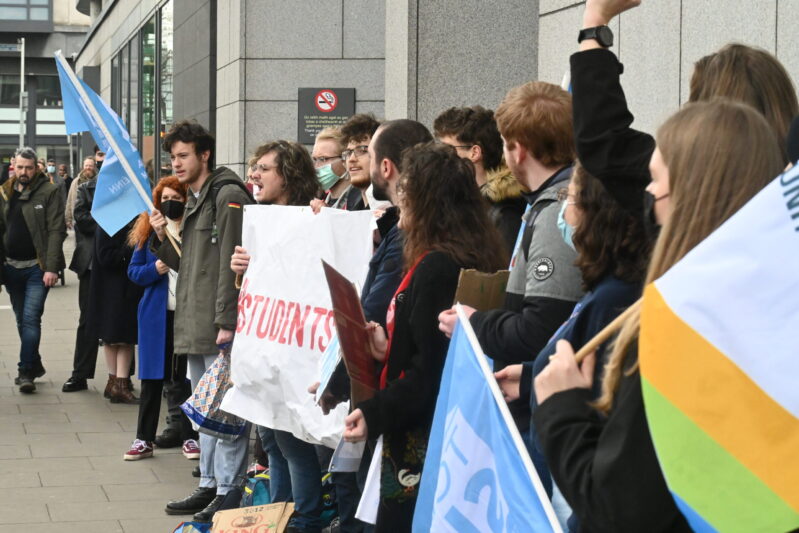Around 30 students gathered at the Science Gallery today to protest its imminent closure, following an announcement that the gallery’s story “is not over” but a new operational and funding model for it is required.
Trinity College Dublin Students’ Union (TCDSU), the Graduate Students’ Union (GSU) and Students4Change organised the protest, which was also attended by Caoimhe O’Carroll, the Union of Students in Ireland (USI) vice president for the Dublin region.
Protesters chanted “Dublin is dying” and “save the Science Gallery”.
TCDSU President Leah Keogh told The University Times that the gallery is a “national treasure” and “national treasures need to be nationally funded”.
Keogh said that the protest served to remind Trinity that the union “won’t be going anywhere” until College commits to a sustainable future for the gallery. “We’ll be using our voice from College Board to weigh into conversations about what the Science Gallery of the future will look like”, she said.
“We’re also here to pay tribute to all that the Science Gallery has been to so many of us over the past decade. And we are here to give thanks to all of the outreach programmes [in the gallery] – it’s one of the few places where Trinity’s community meets the wider community. And we need more of that.”
Speaking to The University Times, GSU President Gisèle Scanlon said: “We have staff that work here and it’s job losses. In a time where every job counts after COVID, when everything shut down, it’s extremely important for jobs in here to be protected.”
“It’s a day for solidarity … it’s everyone together for a common cause.”
“Everything was closed for so long … what a time to choose to close [the Science Gallery]”, Scanlon added.
Speaking to The University Times, O’Carroll said: “We’re standing in solidarity with TCDSU, but also on a wider policy note, the fact that young people and youth culture, cultural hubs like this, are not being invested in nor are they being valued by the county councils, nor government.”
“So we’re to make our voice heard, but also support all unions and student organisers in voicing their concerns and empowering them to do so, and making sure that they continue to mobilise on issues like this.”
O’Carroll added: “It’s really sad to see this kind of thing close. And my hope would be that, you know, they wake up and smell the roses and they open it again in a more sustainable way that it can go longer into the future.”
Provost Linda Doyle said earlier today that the story of the gallery is “not over”, but the current model has run its course and must be re-imagined to tackle its substantial debt.
The closure was first reported in the Business Post last year. The University Times subsequently revealed that the gallery may survive with a revamped model, but would definitely close for a time at the end of the current exhibition.
In an email to staff and students today, the Provost said: “This weekend the doors will close on the final exhibition at Science Gallery Dublin as we currently know it. However, that will not be the end of the gallery story.”
“Looking back, the gallery has been wonderful, but it has had problems in recent years. Unfortunately, in its present form, with its substantial and growing debt, it cannot overcome those problems”, she continued. “The current operational model has run its course.”
“The gallery needs to be totally reimagined and work very differently from the way it does now. Closing the gallery affords us the time to address the problems and build a new, exciting and sustainable way forward.”
The Business Post and the Irish Times reported this week that both the Department of Higher Education and the Department of Tourism were in talks to find a solution to the gallery’s financial problems.








